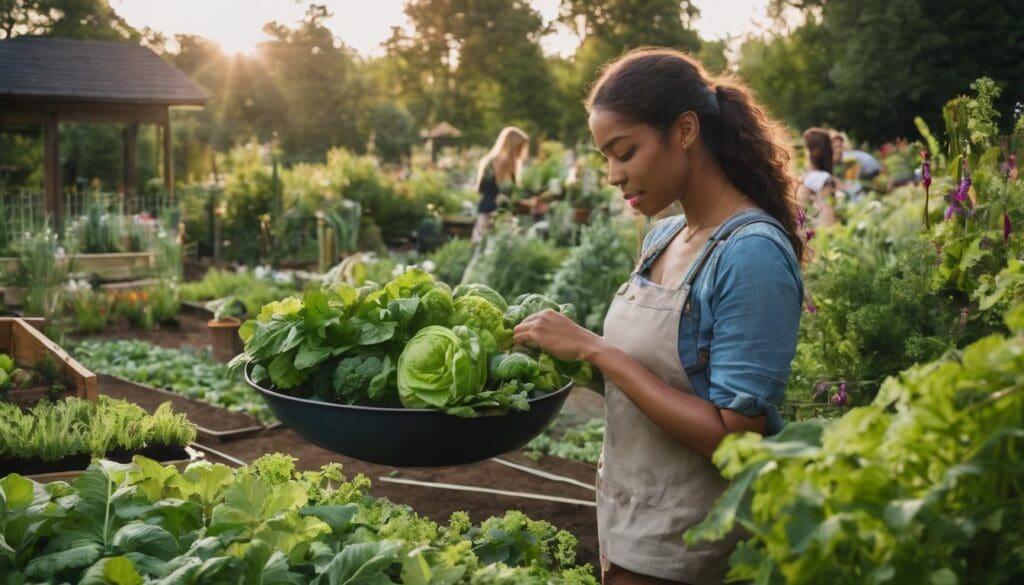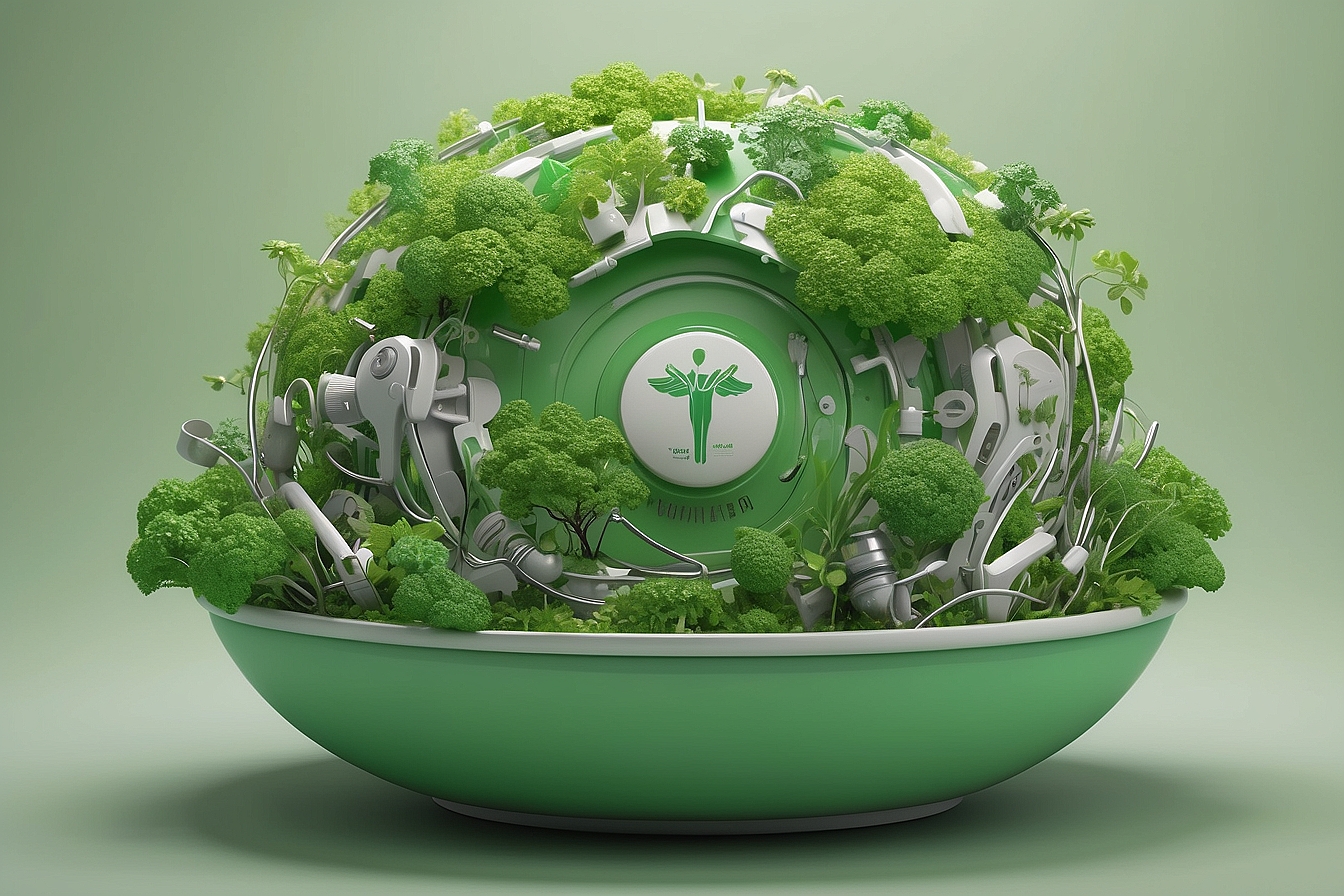As we all strive for a more health-conscious diet, the pressing question of our food’s origins and its nutritional integrity has become ever so pertinent. Just like yourself, we’ve been on quite the journey to unravel this complex tapestry.
Our explorations have revealed that embracing sustainable farming techniques can be a real game-changer for boosting the nutrients in our meals. We’re excited to share how nurturing soil quality, mindful agricultural practices, and thoughtful crop selection can converge to enrich what ends up on your dinner table.
Join us as we unearth a more vibrant route towards combining responsible horticulture with top-notch nutrition!
Key Takeaways
- Sustainable farming methods, such as crop rotation and the use of organic fertilisers, improve soil health which can lead to crops being richer in vitamins and antioxidants.
- Organic practices favour biodiversity and can result in higher levels of secondary metabolites in food, which are beneficial for our health as they act like natural antioxidants.
- Regenerative agriculture enhances soil fertility and ecosystem diversity, contributing to more nutrient-dense foods that support human well-being and conservation efforts.
- By selecting crop genotypes carefully for sustainable farming systems, farmers can grow varieties with better nutritional value while reducing environmental impact.
- Employing precision agriculture techniques optimises resource usage and reduces waste, further increasing the efficiency of sustainable farming in producing nutritious food.
The Connection Between Soil Health and Nutritional Value
Early studies of nitrogen fertilisers have shown a direct correlation between soil health and the nutritional quality of food. Research has also highlighted the impact of cropping system management on improving the nutrient density of crops, as evidenced in sustainable, next-generation tomato production systems.
Early Studies of Nitrogen Fertilisers
We discovered long ago that nitrogen fertilisers could significantly boost crop yields. These early studies revolutionised agriculture, showing us how adding these chemicals to the soil would give plants the essential nutrients they needed to grow larger and faster.
Initially, this seemed like a win for food production and food security.
However, we soon realised there was a downside. Excessive use of nitrogen fertilisers started harming the environment. It led to water pollution and reduced soil health by killing beneficial microorganisms crucial for sustainable agriculture.
This sparked our pursuit for more balanced ways of farming that support both high yields and environmental conservation.
Impact of Cropping System Management on Nutritional Quality of Food
Cropping system management directly affects the nutritional quality of food. By implementing sustainable practices such as crop rotation and soil conservation, farmers can enhance the nutrient density of crops.
This is crucial for promoting healthy eating habits and sustainable food systems. Additionally, focusing on agroecology and biodiversity within cropping systems can further contribute to improving food quality and safety.
Sustainable farming practices play a significant role in preserving the environment while producing high-quality, nutrient-dense foods. Crop production systems that prioritise regenerative agriculture and local food systems have the potential to increase the nutritional value of the produce.
Sustainable, Next-Generation Tomato Production System
To enhance the sustainability of tomato production, we implement innovative practices such as integrated pest management and drip irrigation to reduce water usage. Our focus on soil health involves rotating crops, implementing cover cropping, and minimising synthetic inputs, resulting in nutrient-dense tomatoes.
By prioritising these eco-friendly approaches, we aim to create a next-generation tomato production system that promotes environmental conservation while delivering high-quality produce rich in essential nutrients.
As we continue to develop our sustainable farming methods for tomato production, the integration of advanced technology and precision agriculture will play a crucial role in optimising resource use and minimising waste.
These efforts align with our commitment to supporting conservation and environmental well-being through forward-thinking agricultural practices.
Comparing Organic, Traditional, and Conventional Farming
When comparing organic, traditional, and conventional farming, it is important to consider the different practices and their impact on nutrient density. Organic farming methods focus on enhancing soil health and biodiversity, which can result in higher levels of secondary metabolites and antioxidants in crops.
These factors contribute to the overall nutritional value of food produced through sustainable agricultural practices.
Organic Practices vs. Conventional Practices
Understanding the differences between organic and conventional farming practices is crucial for us as we seek to make informed choices that support sustainable agriculture and conservation.
| Aspect | Organic Practices | Conventional Practices |
|---|---|---|
| Use of Chemicals | Avoid synthetic pesticides and fertilisers, relying on natural alternatives. | Frequently utilise synthetic pesticides and fertilisers to boost production. |
| Soil Health | Emphasise soil building and conservation through crop rotations and compost. | May lead to soil degradation over time due to chemical dependence and lack of organic matter replenishment. |
| Biodiversity | Support higher levels of biodiversity through natural ecosystem management. | Often result in reduced biodiversity due to monoculture and pesticide use. |
| Environmental Impact | Focus on minimising ecological footprints and promoting balance with local wildlife. | Can contribute to environmental issues such as water pollution and habitat destruction. |
| Energy Usage | Typically require less energy due to reduced dependency on synthetic inputs. | More energy-intensive due to the production and application of chemicals. |
| Food Quality | Potentially higher in certain nutrients and antioxidants due to healthier soil. | Consistency and visual appeal prioritised, potentially at the cost of some nutritional aspects. |
| Long-Term Sustainability | Focus on preserving and enhancing agricultural ecosystems for future generations. | May not be sustainable in the long-term due to resource depletion and pollution. |
We’re committed to understanding these differences and sharing insights on how our food choices impact the environment and our health.
Impact on Nutrient Density
Improving nutrient density is a key benefit of sustainable farming practices. By focusing on soil health and biodiversity, organic and regenerative agriculture systems can enhance the nutritional quality of food.
These methods promote higher levels of essential vitamins, minerals, and antioxidants in crops, contributing to more nutrient-dense produce that supports a balanced diet. Sustainable crop production systems also prioritise the selection of crop genotypes with higher nutrient content, further boosting the overall nutritional value of the food we consume.
Additionally, these environmentally conscious agricultural approaches encourage us to consider the impact on food safety and support conservation efforts for healthier ecosystems.
Secondary Metabolites and Antioxidants
Secondary metabolites, such as phenolic compounds and flavonoids, are naturally occurring chemical compounds found in plants. These compounds play a crucial role in the plant’s defence mechanism against environmental stressors and herbivores.
When consumed, secondary metabolites act as antioxidants in the human body, helping to neutralise harmful free radicals and reduce oxidative damage. Antioxidants are known for their potential health benefits, including reducing the risk of chronic diseases like heart disease and cancer.
Farmers utilising sustainable farming practices can enhance the production of these valuable secondary metabolites by minimising the use of synthetic pesticides and fertilisers while promoting biodiversity on their farms.
By focusing on soil health and crop diversity, farmers can contribute to an increased presence of these beneficial compounds in food crops, thereby positively impacting the nutritional quality that consumers receive from their produce.
The Role of Regenerative Agriculture
Regenerative agriculture can improve biodiversity and soil health, ultimately leading to an increase in the nutritional quality of food. To learn more about the impact of regenerative agriculture on sustainable farming and nutrition, continue reading our blog.
Impact on Biodiversity and Soil Health
Regenerative agriculture positively impacts biodiversity and soil health. By diversifying crop rotations, using cover crops, and reducing tillage, regenerative practices promote a healthier ecosystem.
This encourages the growth of beneficial microorganisms in the soil, leading to improved nutrient cycling and water retention. As a result, the increased microbial activity enhances soil structure and fertility.
Additionally, regenerative agriculture helps restore native habitats and promotes plant diversity. This creates thriving ecosystems that support various species of wildlife. By improving soil health and increasing biodiversity on farmlands, sustainable farming contributes to long-term environmental conservation efforts.
Potential for Increasing Nutritional Quality of Food
Sustainable farming practices have the potential to increase the nutritional quality of food. By focusing on soil health and biodiversity, regenerative agriculture can enhance the content of essential nutrients such as vitamins, minerals, and antioxidants in crops.
Implementing sustainable crop production systems that prioritise nutrient-dense foods can lead to improved public health outcomes and support environmental conservation efforts.
Promoting sustainable practices for enhancing nutrient content is crucial for producing healthier food while preserving natural resources. Additionally, selecting crop genotypes that are suited to sustainable farming methods further contributes to improving the overall nutritional value of our produce.
Promoting Sustainable Crop Production Systems
We will discuss sustainable practices for enhancing nutrient content and the importance of crop genotype in improving the nutritional value of our food. Discover how these farming methods can benefit both our environment and our health.
Learn more about the impact of sustainable farming on nutrition by reading the full blog.
Sustainable Practices for Enhancing Nutrient Content
- Implementing crop rotation and cover cropping to improve soil health, enhance nutrient availability, and reduce the reliance on synthetic fertilisers.
- Using organic amendments such as compost and manure to enrich the soil with essential nutrients and promote natural soil microbial activity.
- Adopting agroforestry systems that integrate trees with crops to increase biodiversity, improve nutrient cycling, and enhance overall farm resilience.
- Employing precision agriculture techniques for optimised resource use, minimising waste, and maximising nutrient efficiency in crop production.
Importance of Crop Genotype
Crop genotype plays a crucial role in the nutritional quality of food. By selecting and breeding crop varieties with higher nutrient levels, we can directly impact the overall nutritional value of our produce.
This means that by prioritising crop genotypes with enhanced nutritional content, we can contribute to the availability of more nutritious and healthful food options for consumers.
Additionally, choosing crop genotypes adapted to specific environmental conditions can improve resilience and sustainability while maintaining or even enhancing nutritional value. Selecting crops suited to local growing conditions is key to reducing the need for external inputs like pesticides or fertilisers, further promoting sustainable farming practices that benefit both the environment and human health.
Conclusion: How Sustainable Farming Can Impact Nutrition
In conclusion, sustainable farming practices positively influence the nutritional value of crops. These methods enhance soil health and increase nutrient density in food. Promoting sustainable crop production systems is crucial for improving our diets while supporting environmental conservation.
Sustainable agriculture plays a vital role in ensuring that we have access to nutritious and environmentally friendly food options.
FAQs
1. What is sustainable farming?
Sustainable farming is an approach to agriculture that focuses on growing food in ways that are healthy for the environment, provide economic benefits, and sustain communities.
2. How does sustainable farming affect nutritional value?
Practices in sustainable farming aim to produce nutrient-dense foods by maintaining healthy soils and using fewer chemicals, which can enhance the nutritional quality of crops.
3. Can sustainable methods meet global nutrition needs?
Yes, by adopting sustainable methods, farmers can grow a variety of crops rich in nutrients which can help feed people all around the world.
4. Why should I choose food from sustainable farms?
Choosing food from sustainable farms supports responsible agriculture and often leads to consuming fresher, more nutrient-rich foods.





